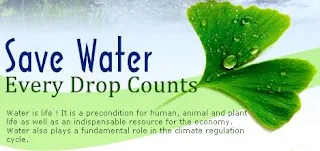SAVE WATER, SAVE LIFE.
-:SAVE WATER SAVE LIFE:-
* use the minimal amount of water pressure needed — often times, a modest trickle of water will suffice … rarely, if ever, is a deluge of water necessary …
* avoid using hot water when warm or cool water will suffice …
* close the water tap any time you are not using the water that pours out of it … for example, close the water tap while:
* brushing your teeth … turn on the water only to rinse your toothbrush and mouth …
* shaving (any part of the body) … fill up a bowl or the sink with rinse water instead …
* washing dishes … again, fill up the sink with water instead …
* washing laundry (e.g., spot-cleaning stains) …
* washing (lathering) your hands …
* washing your hair or lathering your body in the shower … for example, cutting a 10-minute shower to 5 minutes or less can save up to 40 litres of water per shower if you use a shower head that flows at a rate of 9.5 litres per minute (L/min) …
* wash your face and brush your teeth in the shower … you’ll save water and time …
* insulate all hot water pipes to minimize heat loss and expedite delivery of hot water to faucets …
* adjust water temperature wisely … if the water is too cold, turn down the cold water instead of increasing the amount of hot water flowing … likewise, if the water is too hot, decrease the amount of hot water running instead of increasing cold water …
* fix all leaky faucets and connections … replace old washers regularly … little drips add up to litres of water lost … one simple way to determine whether there is a leak somewhere in your home is to read you water meter before and after a 2- or 3-hour period when no water is used (or before and after you leave the house for work) … if there is a difference in the readings, chances are you have a leak somewhere …
* turn off faucets tightly after each use to make sure no water drips … however, avoid closing the faucets too tightly, as this wears out washers quickly …
* install an instant water heater near the faucets you use most frequently (e.g., kitchen sink, shower head) … this way, you can avoid running the tap for a long time waiting for hot water … and this also reduces energy costs …
* retrofit all leaky household faucets by installing aerators with flow restrictors …
* keep a glass bottle or pitcher of water in the fridge for cold water instead of running the tap … also ensure you always have ice for cooling drinks at room temperature …
* fresh fish tank water is full of nutrients that is great for your indoor and garden plants … take the opportunity to water your plants each time you clean your fish tank …
* when changing your pets’ water bowl, throw the old water onto your house plants, your outdoor garden, or trees …
* if you accidentally drop ice cubes on the floor or a dirty surface, allow them to melt in a glass and then pour onto your house plants instead of letting them melt into the kitchen sink …
* reuse towels more than once — a good habit to keep at home as well as on hotel visits … towels take up a lot of space and absorb a lot of water in the laundry machine …
* wash your pets outdoors on the lawn … make sure you use non-toxic, biodegradable natural pet shampoo … your pet (and your kids, the grass, birds, squirrels earthworms, and other critters) will be thankful!
* install a water softening system only if necessary … minimize the amount of regenerations to save water and salt … turn off softeners when you’re on vacation …
* when possible, avoid buying clothing (e.g., non-organic cotton; better choices are linen and organic cotton — which, although still water-intensive, does not contaminate water systems with dangerous pesticides; bamboo not harvested from panda habitat and hemp textiles remain somewhat controversial for some people because of the type and amount of chemicals used in their manufacture … however, keep in mind that almost all textiles are subject to chemical processing and many clothes are actually coated with fire retardant! … silk, wool, kashmir, pashmina, and shahtoosh are not vegan-friendly, and the latter 2 are controversial due to the Endangered status of the Pashmina goats), food (e.g., meat, sugar, canned foods), and other products (e.g., soft drinks, aluminum, paper, etc.) that require comparably large amounts of water for manufacturing …
SAVE THE WATER,
WATER IS LIFE,
I SUGGESTION YOU THAT,
CLOSE THE UNATTENDED PIPE.




It's really a great feeling especially when you teach people to care for mother earth. We should practice this act and spread good deeds to promote fresh air and home for many kinds of species of birds and other animals.
ReplyDeleteMy Pleasure
Delete